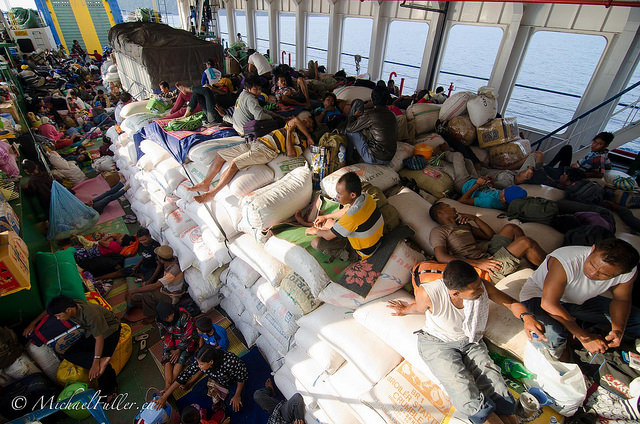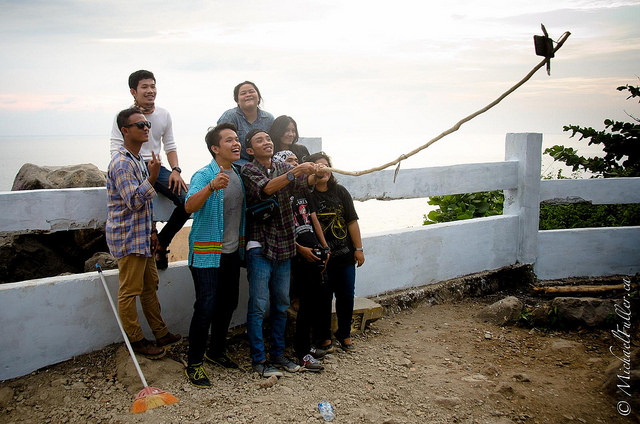Bahasa Indonesia (‘language of Indonesia’) is widely considered the easiest language in the world to learn. Since I’ve been hopeless at every other language I’ve tried, this one was my final chance to escape mono-linguism.
And I’m giving it a good hard crack: I’ve just returned from my fourth trip to the ‘Emeralds of the Equator’ (aka Indonesia). Almost all of that time was spent solo, and outside of Bali. 1 So I was not just able to practise, I was forced to. And in these months, the locals taught me some great words and expressions which were not in my phrasebook.
Now I’d like to share them, so you can add them to yours!
1) Apakah anda bercanda? (“are you joking?”)
As you may have read in Four Tips to Bargain Better, with Smiles and Laughs I like my bargaining sessions heavy on the laughter. This phrase is one I learn in every language, and I use it with a smile when someone asks too high a price for something. Admittedly I’ve got a lot of practise at being cheeky, but it nearly always gets a laugh.
Indonesians are incredibly fair (outside of Kuta) so fortunately you won’t need this phrase as often as in most other countries.
(pronounced aPAKa ANda berCHANda”)
2) Lain kali (“another time”)
The least aggressive touts in Asia can be found lounging the streets of Indonesia, politely offering their services or products as you walk past.
One thing you must know about bahasa is that things are declined simply by saying “Thanks” (which means “no, thanks”). But for us foreigners, it doesn’t feel quite right – like we might confuse them without a negatory.
So my favourite response to such offers, not least because it guarantees smiles since few foreigners know it, is “another time”.
(pronounced LIE-in KAA-lee)
3) Sudah, sesudah, belum, and sebelum (already, after, not yet, before)
This is not a phrase, these are four handy, separate but related words. (Related, because of the beautiful nature of bahasa). A very quick lesson on some wonderful aspects of this language:
- there are no verb tenses (hooray!) so you need to chuck in words like these to describe anything you’re not doing right now.
- many words are created by adding prefixes or suffixes to root words. In this case, sudah (“already”) gets a prefix and becomes sesudah (“after”). I trust you can see how “already” and “after” are related (if you’ve already done something, it’s now afterwards)
The same connection exists for belum (“not yet”) and sebelum (“before”).
When to use these?
- The handiest is sudah, which you can utter while patting your stomach, as a quick polite response to streetside restaurant invitations.
- If you’re single like me, you’ll be asked daily if you’re married. Responding tidak (“no”) in Indonesian actually implies “never”, so you must instead say belum (“not yet”). Unless you intend on being single forever… (I don’t.)
(pronounced soo-DA, beh-LOOM, SEH-soo-da, SEH-beh-loom)
4) Sebentar (“a moment”)
If your brain moves like mine (at the speed of molasses) you often need to ask people to wait a moment while you figure things out.
Until I learned this I was using the exact translation from english of “one minute”, which had people reaching for their stopwatches.
(pronounced seh-BEN-tar)
…And now the final two! I’ve saved my favourites for last:
5) Cuci mata (“washing my eyes”), or makan angin (“eating the breeze”)
As you roam the streets of Indonesia, the single most common thing anyone will say to you is ‘ke mana’. (“where are you going?”)
They aren’t being rhetorical (like our ‘wassup’) – they really want to know what us strange foreigners do in their country.
If you lack the linguistic dexterity to expound your itinerary, or you’re downright sick of answering the same damn question all the time, use one of these phrases. I promise you’ll get a laugh.
(pronunced choo-chee ma-ta & ma-kan ANG-in)
6) Tongkat narsis (“narcissism stick”)
How good is this:
In Indonesian, the selfie stick is called tongkat narsis (shortened to ‘tongsis’). I reckon we ought to do the same in english, i.e. a “narcissis-stick”.
Maybe not that useful. But I just had to tell you.
I love talking to strangers, connecting with people from all cultures. Learning local phrases and slang is one great way to do that. It gives people a laugh, shows you’re interested in their culture, and tricks them into thinking you have a sense of humour.
Now, go forth to Indonesia, and be useful and funny!
-Mike
p.s. Please share your experiences with my fun and useful phrases, in the comments.

























Mike, did I ever mention this to you?
http://www.urbandictionary.com/define.php?term=Wand+of+Narcissus
Haha that’s good, but I think Narcis-stick is even better!
I’m Indonesian and I must say that I’m impressed by your knowledge of Indonesia.. Tho not all of your definition is accurate, I still appreciate this <3
Hi Wina, thanks for your kind words. What were inaccurate about my responses? I learned most of this from Indonesian people, so I’m a bit surprised if I’m really off on something (probably lost in translation)
For instance, “apakah anda bercanda” is incredibly polite and doesn’t sound quite right to be something spoken by a local. The confusing thing about Bahasa Indonesia is that the “correct” way to speak is almost never the actual way people speak.
A more natural way to say it on the street would be “Duh, si abang becanda aja deh!” (“oh you’re just joking” to a male). It has a bit of Jakartan twang to it, but it’s a style that’s generally understood across Indonesia (thanks to Indonesian TV programmes, which are very heavily Jakarta-centric).
A somewhat more polite and dialect-agnostic way to say it could be “Wah kamu becanda ya!?” (“ah are you joking?”)
Locals are probably more likely to teach the “proper” Indonesian, but try ask them to teach you the street version. It’s very different, but definitely closer to how they normally speak, i.e. a lot more useful on the street ;)
Harry, thanks for the tip!! :)